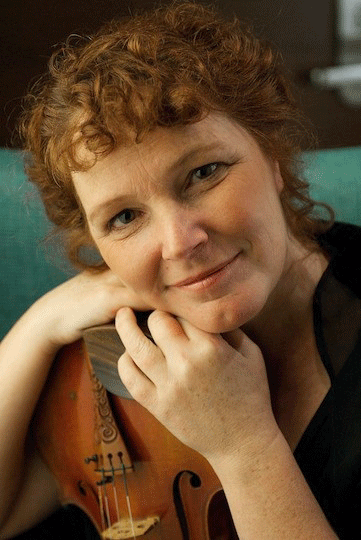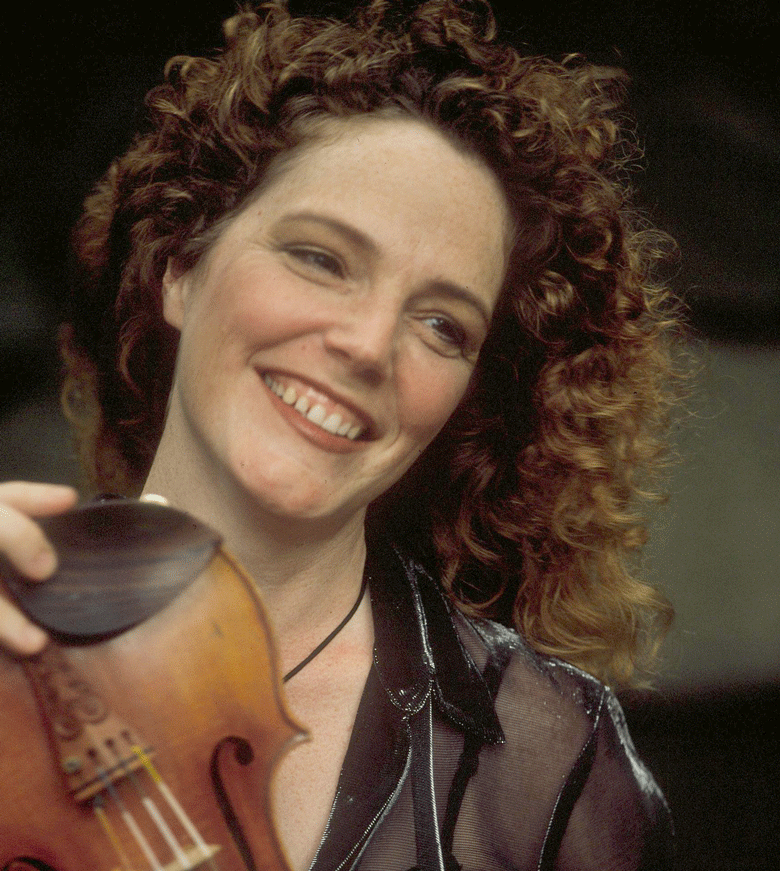Bonnie Rideout’s house on Cliff Island is on a small bluff jutting to the south, ringed by steep shale cliffs descending into the ocean. The house was used in the filming of The Whales of August in 1987.
Rideout gave me a quick tour of the old house, showing me an antique ice box and 4-foot-tall 1940s radio before we sat down for our conversation on the deck, where I marveled at the view of Jewel Island, wrapped in a thin curtain of fog.
The interview has been edited for length and clarity.
The Working Waterfront: Can you tell me about what style of music you play?
Bonnie Rideout: I play Celtic music. But specifically, the Celtic music I play is Scottish fiddle.
WW: What makes Scottish music unique?
Rideout: Stylistically, Scottish fiddle music was often influenced by the bagpipes as well as the Gaelic language and even dance. So, the ornamentation is unique.
“I compose most of my music when I’m here on Cliff Island. I recorded one of my albums out in the tower on Jewel Island.”
Scottish fiddle music has such a rich history. People would compose and write the music down, as opposed to it strictly being passed down in the oral tradition. Some of it was composed before the Scottish Enlightenment.
It was also influenced by art music in Europe, so it comes out of a tradition of really fine composers and is artistically and technically very well developed. It is also a dance music and there’s certain dances in Scotland that are unique only to Scotland. I love the ancientness of it.
WW: When did you first decide you wanted to be a musician?
Rideout: Music was a way of life in my family. We always played it, especially when we were down here on the island. We had no television. We played music as entertainment, so it was something we always did.
But I wanted to be a veterinarian until high school when I started to realize being a veterinarian was a science. I realized biochemistry was not my thing. I probably started getting really serious into thinking about it as an occupation in high school.
WW: Who are some people who inspired you?
Rideout: I just completed a series to be submitted to the Library of Congress. The two people I chose as influences are both in their 80s.
Chester Pettengill lives on the island. I’ve played with him ever since I was eight years old. We’ve played in the island church every year. We do the hymn-sings and play at the Sunday services.
The other person, of course, is my mother. My mother has taught piano for 55 years and she was my very first influence. I did a recording with her and it just came out this year. She’s 84. She started composing when she was 78. You’re never too old to learn something new.

Within the genre, I lived in Scotland and performed with a lot of Scottish fiddlers there. There were certain people that influenced me in Scotland, such as Ron Gonnella and other old-timers.
I compose most of my music when I’m here on Cliff Island. I recorded one of my albums out in the tower on Jewel Island.
We brought a recording crew out there. The tower had splendid natural acoustics. A storm came up during the session and we recorded it while I played. It was magic and we kept it for the last track which ends just with the rain and distant thunder.
I think of Cliff Island as my thinking place. It inspires me, the nature, and of course the people are really special to me. How often do you see and know people your entire life since you were a little kid? Some people have known me since I was born. And I’ve known people since they were born. When you have a cohesion like that in your life, it helps you to slow down and to reflect and think and be inspired.
WW: How has the music industry changed since you began recording?
Rideout: It’s a sad story. For a lot of musicians, we have had to reinvent ourselves. But some of the ways technology has changed things are good. For example, when I was first recording, you had to be at a certain high level. To go into a studio to record, you had to be backed by record labels. Now anyone can sit in their living room, record, and put their music out there.
I think access to music has improved a lot for just the average listener. It’s more difficult for a musician though to earn a living now. People used to buy their products—tapes, CDs. When I would go touring—I toured for 30 years—sometimes you only got a small amount of pay when you played in a concert hall, but you could make up for it by selling merchandise.
Now, people download it online. All my recordings are on iTunes and all of those platforms, but my royalties have practically dried up.
But musicians are always going to be there and they will find ways to make a living. But unless you’re actually touring, it’s very difficult to make a good living.
WW: Could you tell me more about why you had to stop touring?
Rideout: The day I was diagnosed was an unfortunate day. It was Sept. 12, 2001, the day after the 9/11 attacks. I got a call from the doctor. I had gone in for tests because I had all these symptoms that were just not adding up. I had all this tingling in my hands. I was losing my balance. I just kept blaming it on stress.
But I went in for an MRI and they saw the lesions in my brain. I also had a spinal tap and they finally diagnosed me with multiple sclerosis.
I toured for another few years because my agent booked me out two years in advance, so I had to fulfill all my obligations.
But with MS, I will have an episode where I lose control of the right side of my body. When I have an episode, I can’t feel my right leg at all, so I’m pretty much paralyzed on my right side. And the tremors come.
It’s triggered by heat, fatigue, and stress, all factors in a musician’s touring life. You’re always tired. You’re always getting hot on stage, and the stress is tremendous. I never could predict when I was going to have an episode. If there’s a 3,000-seat hall sold out and suddenly I can’t hold my violin, that’s a problem.
It got where it was progressing to a point where it was just too stressful. I have to change my life. I’ve managed my MS without medications so far by just basically changing my lifestyle. If I start to overheat, I just go in the ocean to stay cool.
The island is a lower stressed lifestyle.
I’m still playing my music and still composing. On good days I record.
WW: What advice would you give to musicians that are trying to start their career?
Rideout: I have thought a lot about this and I feel pretty strongly about it. I took a relatively obscure genre of music and wound up playing in the Kennedy Center and many more major venues. I would say what got me where I am and gave me the career I have was learning more than just music.
When you go to music school—I went to music school—you spend all your time honing your craft. What I advise musicians to do is to take a business class to understand the industry. It’s understanding people, working with people, humbling yourself, and asking for help along the way.
There is a lot more than just music if you want to be a musician. You have to be willing to be very versatile in other areas.
My least favorite part of music is self-promotion. But you have to get yourself out there and you have to promote yourself because no one else is going to do it.
When you’re on the road it takes all year to put together a tour. I’m hiring tour buses, and I got road managers, and I’ve got venue people to work with. What you see on stage is 1/10 of what I do offstage.
WW: Could you tell me about your newest project?
Rideout: I’m working on a project I hope to come out maybe in a year. It’s about the Scottish music of George Washington. I’ve been doing research for a couple of years on and off at Mount Vernon, which is right up the road from where I live in the winter in Alexandria, Virg.
Some of these songs were in Martha Washington’s music books. She also played the harpsichord, as did her daughter and granddaughter. I discovered a few things that haven’t been noticed in the manuscripts before. I’m working on a recording with violin, harpsichord, and cello. Hopefully it will either be recorded at Mount Vernon or up at Bowdoin College.
Read more of Kai Holloway’s writing at his blog.





